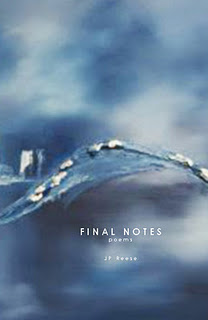
Cover of my first book of poetry, Final Notes, from Naked Mannekin Press, $10.00 through PayPal (includes postage). All orders: FinalNotes16@gmail.com. http://www.nakedmannekin.blogspot.com/2012/01/final-notes-by-jp-reese.html Send your shipping address to FinalNotes16@gmail.com and I will send you a signed copy.
Poet Sam Pereira says of Final Notes: Too many times, the idea of a “chapbook” substantiates the claim that poetry has little, if anything, left to say. In JP Reese’s Final Notes, nothing could be farther from the truth. We get snuck up on with lines like “Danger rests in believing the honest blue of the sky.” Remarkably understated, it becomes a sort of poetic fortune cookie, not to be tossed aside, but held on to as our journeys progress.
Another example is the stunning poem “Evanescence,” where we come away feeling the addictive nature of commingling in darkness. There is joy in this knowledge that warmth, however it is made aware to us, is momentary in its dynamic, but worth taking. The poem “2008, What I Wanted” offers wisdom beyond anything that might be stated here about it. This is a manifesto to the world on how not to treat those left breathing.
JP Reese has the skill of an artist and the soul of a survivor. The proof is compiled in a perfectly lean volume that needs to be read with admiration for years to come. Those looking to find that most rarified of beings, a genuine poet, need look no further.
Sam Pereira’s books include The Marriage of the Portuguese (L’Epervier Press, 1978), Brittle Water (Abattoir Editions/Penumbra Press, University of Nebraska at Omaha, 1987), and A Cafe in Boca (Tebot Bach, 2007):
© 2012 by Sam Pereira
Poet Shara McCallum says: These poems are resoundingly of our time. JP Reese’s collection, Final Notes, offers personal lyric-narratives about various subjects: love and desire, a marriage strained by alcohol abuse, a mother’s love for her child, a daughter’s devotion to her aging and declining father. They also speak to public narratives that inscribe our contemporary American lives: 9-11, the war in Iraq, the collapse of the economy and Wall Street’s complicity and corruption. Often, as in “2008, What I Wanted,” the personal and public intersects, naturally and to moving effect. Whatever this poet addresses, her poems reveal the poet-speaker’s desire to speak with complexity and honesty to the totality of what it is to be human. They succeed in doing this largely through the persona she constructs (one that the striking poem addressing Sexton and Plath suggests is the inheritance of Confessionalism). The poems also move us through the sheer force of their images; and Reese’s deft capturing of an unexpected detail frequently reveals the underbelly of what, at first glance, seems ordinary. The title of one of her poems, “It is What It is,” is a catch-phrase in American idiom that highlights one of the primary tensions in this collection. Like that phrase, Final Notes is resigned to looking at ‘what is’—though not to embrace a cynical view of the world but, rather, to find a balance between denial and hopelessness. The “bright razors” with which Reese speaks, then, dissect difficult experience but, also, become a healing.
Shara McCallum’s books of poetry include This Strange Land (Alice James Books, 2011), Song of Thieves (University of Pittsburgh Press, 2003) and The Water Between Us (1999), winner of the 1998 Agnes Lynch Starrett Prize. Her poems have won a college prize from The Academy of American Poets. McCallum’s poems have been anthologized in The New American Poets: A Bread Loaf Anthology (ed. Michael Collier, 2000). McCallum teaches and directs the Stadler Center for Poetry at Bucknell University.
Author Susan Tepper: It isn’t often one reads a book of poetry that is both immediate and visionary. Such is the case with “Final Notes,” a searing new collection by JP Reese. These poems float, they gut-punch, they bleed, they cry out for more space in a shrinking world.
Susan Tepper is author of From the Umberplatzen: A Love Story, Deer and Other Stories, and What Might Have Been: Letters of Jackson Pollock & Dori G.
Poet and Author Marc Vincenz on Final Notes:
The poems in JP Reese’s Final Notes are deeply personal: letters, sketches, faded photographs, white noise emerging from dreams. Late at night, a cold calm permeates the house, a great sigh emanates from the bones. In precisely that moment clarity arrives. But clarity is not always revelation; it may be realization rather than resolution. Perhaps it is that instant you stop searching for meaning that change occurs and renewal begins. In these wrought iron imagistic poems, Reese invites us inside her four fissured walls. Here man and woman lose their desire yet somehow fall together in grace, a father repairs a chair in the company of bees, a parent’s aspirations for her son remain unfulfilled, even the self becomes invisible in its own reflection. Thirst may never be quenched, for as our children dance, gravity waits patiently in “the clay beneath our feet.” And in the night-silence of corridors, still the unspeakable speaks.
Marc Vincenz is the author of Upholding Half the Sky, The Propaganda Factory and the forthcoming Pull of the Gravitons.
